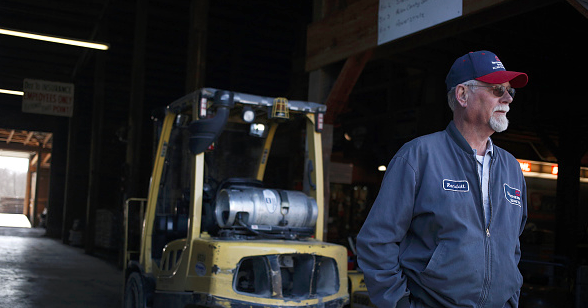Photo of the Month: March 2016

This month's photo features one of the workers affected by free trade agreements. The North American Free Trade Agreement (NAFTA) and the Trans-Pacific Partnership (TPP) have been major topics on the presidential campaign trail, as candidates argue over the effects these treaties have had or will have on U.S. workers.
A popular argument on both sides of the aisle is that NAFTA has cost hundreds of thousands of American manufacturing jobs, particularly in the automotive industry. The Trans-Pacific Partnership, which President Obama signed in October 2015, has been the subject of similar concerns by workers. Eduardo Porter in the New York Times writes that voters who have lost their jobs due to trade agreements "have a point," and that their anger is helping drive support for candidates who decry NAFTA such as Donald Trump and Bernie Sanders:
Voters’ anger and frustration, driven in part by relentless globalization and technological change, may not propel either candidate to the presidency. But it is already having a big impact on America’s future, shaking a once-solid consensus that freer trade is, necessarily, a good thing…
What seems most striking is that the angry working class — dismissed so often as myopic, unable to understand the economic trade-offs presented by trade — appears to have understood what the experts are only belatedly finding to be true: The benefits from trade to the American economy may not always justify its costs.
However, that might not be the whole story. Elsewhere Porter writes:
But the autoworkers’ animosity is aiming at the wrong target. There… is a good case to be made that without Nafta, there might not be much left of Detroit at all.
“Without the ability to move lower-wage jobs to Mexico we would have lost the whole industry,” said Gordon Hanson of the University of California, San Diego, who has been studying the impact of Nafta on industries and workers since its inception more than two decades ago.
Even in the narrowest sense — to protect jobs in car assembly plants — a wall of tariffs against America’s southern neighbor would probably do more harm than good.
So how have U.S. jobs been affected by NAFTA, really? It is difficult to tell. Politifact called it an "overstatement" when Sanders said 800,000 jobs have been lost, but also says the truth is difficult to tease out:
Economies are enormously complex systems and economists can reach different conclusions based on the factors they consider and the assumptions they bring to bear. Part of what makes the legacy of NAFTA challenging to assess is that in the last year of his presidency, Bill Clinton signed legislation granting China permanent normal trade relations. From 2000 on, this had an enormous impact on trade between the two nations. That overlaps with about half the period when analysts have tried to gauge the effect of NAFTA…
Sanders said that NAFTA, which Clinton used to support, cost the U.S. economy 800,000 jobs. There is a report from a left-leaning policy group that reached that conclusion. On the other hand, many other nonpartisan reports found that the trade deal produced neither significant job losses nor job gains.
Click here for more monthly photos on people and issues we care about.
Comments are closed here.